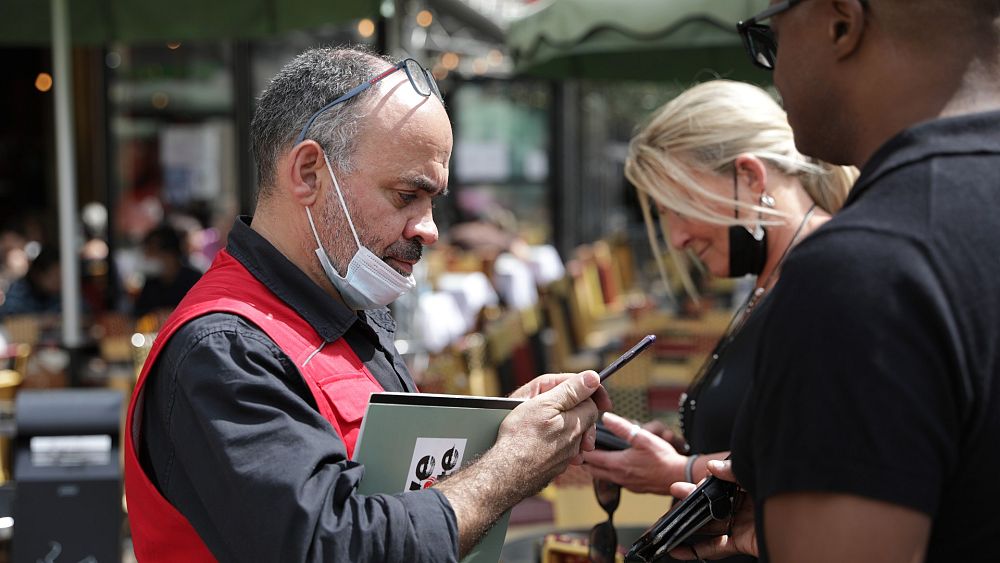
Hospitality professionals in France are worried about the impact the COVID-19 health pass is going to have on their businesses as its use was extended to bars and restaurants on Monday.
The health pass — attesting its holder has either been vaccinated, tested negative over the previous 72 hours or recovered from the disease during the previous six months — was first rolled out in France on July 21.
Then it was only required to access cultural and leisure venues with a capacity of more than 50 people.
But since Monday (August 9), it is required to visit bars, restaurants, health centres and to use long-distance public transport.
Didier Chenet, president of the GNI-HCR union for independent hospitality businesses, said on Sunday that applying the law will be “very complicated”.
He told RTL radio of professionals’ uncertainty over how to deal with “the behaviour of the recalcitrant customer refused entry to the restaurant”, how to control people on terraces and the financial impact it will have.
“Cinema professionals say that they have a very slight loss of business, will it be the same for us? This is the question we are asking ourselves. And finally, the big difficulty for us will be the controls on [restaurant] terraces: it is mission impossible,” he said.
“Terraces are open spaces, the customers come and even before entering the restaurant (…) they sit down, they take a table and what do we do? We control and we tell the customer who doesn’t have a valid health pass to leave. It’s going to be very, very complicated,” he added.
Another union for hospitality businesses, UMIH, estimates that “the health pass could lead to a 15-20% drop in visitor numbers”.
Meanwhile, Transport Minister Jean-Baptiste Djebbari, said on Monday that passengers on about a quarter of long-distance train services will have their health passes checked.
Domestic flights and long-distance bus travel is also concerned.
The controls “will be massive, they will not be systematic because we have 400,000 passengers a day on trains, to speak only of trains, and it is therefore quite impossible to control everyone at all points,” Djebbari told reporters during a morning visit to the Gare de Lyon station in Paris.
“Things are going well,” he added, citing the case of a train with several hundred passengers in which three people were refused boarding.
“Two were referred to a friendly pharmacy which was able to carry out the tests and the people were able to exchange their tickets and take a train later. The third person chose to have the ticket refunded,” he said.
Anyone caught trying to break the rules will be fined a minimum of €135 and up to €750. Three offences within a six-month period can lead to a fine of up to €3,750 and a six-month jail sentence.
Government spokesman Gabriel Attal conceded on Monday that the extension of the health pass is an “additional constraint” but said it is necessary because of the deteriorating sanitary situation.
According to Santé Publique France, critical care units across the country received 1,510 patients on Saturday, compared to 1,099 a week ago. The number of hospital admissions rose to 8,425 from 8,368 on Friday.
“The pass and the progress of vaccination should see us avoid other curfews and lockdowns,” Attal added.
More than 66% of France’s population has received at least one dose of the vaccine and 55.2% is fully vaccinated.